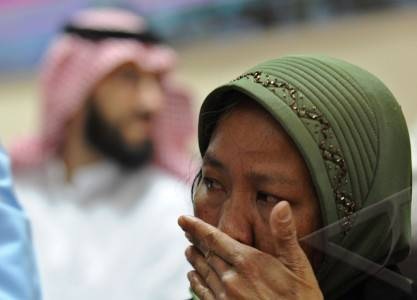An Indonesian maid badly beaten by her Saudi employer is recovering but faces more operations, an Indonesian diplomat said on Saturday, as the Saudi labour ministry said it regretted the case.
Members of Migrant Care Indonesia protest over the torture of domestic worker Sumiati Binti Salan Mustapa, outside the Saudi Arabian embassy in Jakarta on November 19. An Indonesian maid badly beaten by her Saudi employer is recovering but faces more operations, an Indonesian diplomat said on Saturday, as the Saudi labour ministry said it regretted the case.
Sumiati Binti Salan Mustapa, 23, remains in hospital in Medina but faces more operations after being found two weeks ago suffering from stab wounds, burns to her scalp and other injuries from an abusive employer, said Diddi Wahyudi, an official of the Indonesian consulate in Jeddah.
"Sumiati is recovering now. She is in a good state of health... her appetite is good," Wahyudi told AFP.
"But she needs to be operated on at least once again, on her abdomen," he added.
The case shocked and outraged rights groups and labour activists as another example of the paucity of protection for millions of mostly Asian domestic workers, especially in Saudi Arabia and the Gulf states.
Her employer, a Saudi woman who has since been arrested, allegedly beat the maid, causing internal bleeding and broken bones, put a hot iron to her head and stabbed and slashed her with scissors.
On Saturday Saudi Arabia's labour ministry said in a statement it was sorry about the case, but called it an isolated incident.
"The ministry expresses its regret for what happened to the Indonesian woman Sumiati," it said in a statement on the official SPA news agency.
"What happened is an individual case and it should not be generalised. "
"There are more than 670,000 domestic workers of all nationalities in the kingdom and they enjoy full rights. Such individual cases are offensive to everyone," it said.
Sumiati was visited in her Medina hospital room on Thursday and Friday by Indonesian state minister for women's empowerment and child protection, Linda Agum Gumelar.
Wahyudi said Sumiati is still seeking her pay and other benefits from several months of employment in Saudi Arabia.
"She has nothing, she does not even have a single abaya," Wahyudi said of the black cloak that all women in Saudi Arabia must wear in public.
"She wants her employer to be punished severely," he added.
He said the Indonesian government was still pursuing the case of another Indonesian maid, Kikim Komalasari, whose beaten body was found near Abha earlier this month.
Two people, her employers, have been arrested in that case, Wahyudi said.

Comments